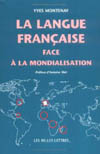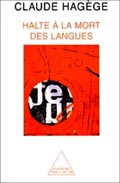"La langue française face à la mondialisation"
 |
|
by Yves Montenay
If Versailles and the Enlightment were triumphal times for our language, nowadays the French language suffers the shock of America and globalization. Is the battle lost ?
This book recounts its turbulent history, does the account of loyalties, advances and declines and relates the initiatives of officials and activists.
Language : French
Publisher : Belles Lettres (10 mai 2005)
Format : Paperback - 321 pages
ISBN : 225144291X
|
Why are languages disappearing?
Linguists estimate that in 100 years fewer than half the world’s 6,000 languages will still be in use. Will this mean a more peaceful, communicative world or an arid linguistic desert, subject to the tyranny of the monoglot yoke? In answering this question, Dalby and McWhorter take us on a fascinating and colorful spin through history...
|
McWhorter likens linguistic change to Darwin’s theory of evolution, arguing that languages, like animals and plants, inevitably split into subvarieties, alter in response to environmental pressures and evolve new forms and useless features. In prose that is bold and compelling, he warns against seeing grammar as a repository of culture, arguing that it is more often formed by chance and convenience and does not reflect its speakers’ world view any more than “a pattern of spilled milk reveals anything specific about the bottle it came from.”
John McWhorter, The Power of Babel,
Hardcover: 384 pages ;
W H Freeman & Co;
ISBN: 0716744732; February 2002.
| |

|
Rather than disassociating languages from the people who speak them, Dalby takes on the difficult but equally rewarding challenge of drawing out the distinct consciousness expressed by each tongue. As Babel becomes homogenized, surviving languages have fewer new words and ideas to draw on.
Andrew Dalby, Language in danger,
Hardcover: 352 pages;
Allen Lane The Penguin Press;
ISBN: 0713994436; May 2002.
|
Despite these differences, both authors agree that with each language we learn, our ability to comprehend the world is given fresh, new scope.
Why are these languages disappearing?
Globalization is the modern equivalent of Genghis Khan, both authors argue. English is now competently spoken by about 1.8 billion people worldwide. Parents consider it the key to a more prosperous life. Fearing that without fluency in the languages of the cultures of “tall buildings” their children will be deprived of standardized education and the ability to reap the rewards of international trade, they allow their own tongues to die off with the elderly.
Dalby and McWhorter rewrite the script on language change from nearly opposite but equally intelligent perspectives, agreeing on the most significant point: if our rich linguistic heritage is not preserved, even English speakers may find themselves uncomfortably lost for words.
Source : Newsweek, August 12, 2002.

"Halte à la mort des langues"
Claude Hagège
Twenty five languages disappear a year in the world
The famous French linguist Claude Hagège continues his vibrating and informed defence of the world " écolinguistic " balance. For him every language offers a range of different interpretations from the universe, the cultural importance of which is irreplaceable.
If the Amerindian languages are disappearing today, it is because the parents do not want to pass on them any more and prefer to send their children to the English-speaking school.
But this choice is only the resultant of a struggle for existence between the ancestral language and the one who allows to fit economically; the choice which is made is that of the economic efficiency to the detriment of the conservation and the enrichment of the cultural inheritance. The desolation of a language is always the resultant of a similar situation of confrontation between dominated language and dominant language, a natural selection of neo-Darwinian type.
A language can always adapt itself, grow rich; what condemns it is the absence of political will.
The French are the first to doubt the value of their language. The penetration of the English - American vocabulary in their language is stable: around 7 %.
But if one has the feeling to be submerged by English - particularly in certain socio-economic circles - it is not because the lexical field is invaded, but because of the poverty of the vocabulary used by a large number of French...
|
" Halte à la mort des langues ",
By Claude Hagège, Odile Jacob, 402 p., 140 F.
Echo
" Half of the native languages in the world are disappearing "
Program of the United Nations for the environment ( PNUE).
Nairobi, February, 2001
|  |
" The disappearance of a language
and of its cultural context
means burning a unique book on the nature " ( PNUE).
The PNUE made the defence of cultures and native languages one of the priorities for the environmental protection.
" The secrets of nature, contained in songs, tales, art and craft of the native peoples, can get lost for ever because of the increasing globalization in all the domains. "
" Studies estimate to 5.000 in 7.000 the number of spoken languages in the world among which 4.000 in 5.000 are native. Now, more than 2.500 are threatened with immediate disappearance and many of the others lose bit by bit their links with the nature. "
" The culture is the first source
of knowledge and science and
takes its source in the local environment "
Wole Soyinka ( Nigeria)
Nobel prize 1986 of literature
" The native peoples detain a vital knowledge on animals and plants of their environment and they preserve religiously in their cultures and traditions the secrets about the manners to return their viable environment and the earth in a friendly environment, in a durable way "
Klaus Toepfer
Executive director of the PNUE
SOME FIGURES
32 % of the spoken languages in the world are in Asia
30 % in Africa
19 % in the Pacific
15 % on the American continent
3 % in Europe.
Papua - New Guinea arrives at the head of the number of spoken languages, with 847.
Indonesia ( 655 )
Nigeria ( 376 )
India ( 309 )
Australia ( 261 )
Mexico ( 230 )
Cameroon ( 201 )
Brazil ( 185 )
The Democratic Republic of Congo ( 158 )
The Philippines ( 153 ).
This research was led by numerous academics and the synthesis was made by Pr. Darrell Addison Posey of Maranhao's Federal University, in Brazil and by the Centre for the environment, the ethics and society of the school Mansfield, at the University of Oxford, in Great Britain.


